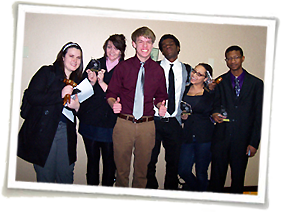FAQs

1. Is it fun?
Absolutely. Most people meet their closest friends in college on the team and look back on tournaments as some of their favorite experiences from college. Most people also enjoy the thrill of competition that the team provides.
2. Do I need to have high school experience to participate?
While competitive experience in high school is helpful, it’s not necessary. We’ve had past national champions with extensive experience and some with no experience. All you really need to be successful is to have a sharp intellect and a willingness to learn and work.
3. How much of a time commitment does participation involve?
Participation on the team does involve a substantial time commitment. We practice about three hours per week and compete at about ten tournaments over the course of the year. However, team members still maintain a life outside of the team and maintain high grades in classes.
4. Are scholarships available?
Yes. The University offers a limited number of renewable scholarships for members of the team. Scholarship decisions are made on the basis of both past success and potential for future success. Scholarship decisions are typically made during the spring, so it’s important to apply early for a scholarship.
5. What are tournaments like?
Typically, tournaments start on Friday afternoon and end on Sunday, meaning that we leave Friday morning and return Sunday night for most tournaments. Usually, we have to travel 3-5 hours to attend tournaments. Tournament expenses, such as lodging and food, are covered by the University.
6. How successful is the team?
According to the National Parliamentary Debate Association (which has over 200 members), McKendree has been ranked as high as seventh in the nation. Additionally, McKendree students have advanced to final rounds at the National Parliamentary Tournament of Excellence, the National Parliamentary Debate Association championship tournament, the American Forensic Association national individual events tournament, and the National Forensic Association championship tournament.
7. Have former competitors been successful after graduation?
We have had many people continue on to graduate studies. We have lawyers, doctors, teachers, and individuals who continue to work for the University among our alumni.
